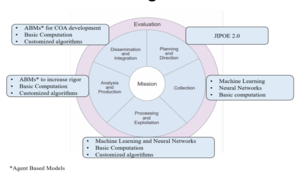Computation and Artificial Intelligence for Integrated Campaigning

“Computation and Artificial Intelligence for Integrated Campaigning“
Speaker: Pike, T. (National Intelligence University)
Date: 9 October 2019
Speaker Session Preview
SMA hosted speaker session presented by LTC Thomas Pike (National Intelligence University) as a part of its Future of Global Competition & Conflict Speaker Series. During part two of his two-part brief, LTC Pike focused on a primary argument made in his dissertation: Computation is a critical tool necessary to analyze complex systems, and its use must be expanded across the Joint Force. He stated that artificial intelligence (AI) is a discipline that consists of a suite of different computational approaches. There is no universal algorithm, and every situation is different. Furthermore, each approach and sub-approach has its strengths and weaknesses. LTC Pike then explained that what allows AI to flourish is the ecosystem of computational tools and code that surround it. Each tool or code can be used for different purposes, and code stores knowledge that others can employ in a wide variety of situations. Moreover, in order to strengthen AI, the ecosystem of tools and code must become vast, which can be done by individual users providing open source data and building up public libraries. LTC Pike then provided a critical overview of how the open source/AI community works and how it allows individuals with even basic skills to perform advanced computational and AI-related tasks. He stated that open source code is often incredibly easy to use, and simply with a knowledge of what certain algorithms can do, any practitioner can utilize it. LTC Pike then spoke about how the Joint Force cannot just integrate current AI tools into the Joint Intelligence Process (JIP) and the Joint Planning Process (JPP) but set the conditions to lead the way for leveraging emerging tools and encoding the workforce’s current knowledge. To conclude, LTC Pike provided a series of recommendations. He advocated for the increased use of computation and explained that the Joint Force can improve the Joint Intelligence Preparation of the Operational Environment (JIPOE) process in two ways: 1) by managing the analysis of relevant actor interdependencies to better understand links between behavioral trends and outcomes and 2) by expanding the use of AI and its collection of computational tools in order to do so more rapidly.
Comments